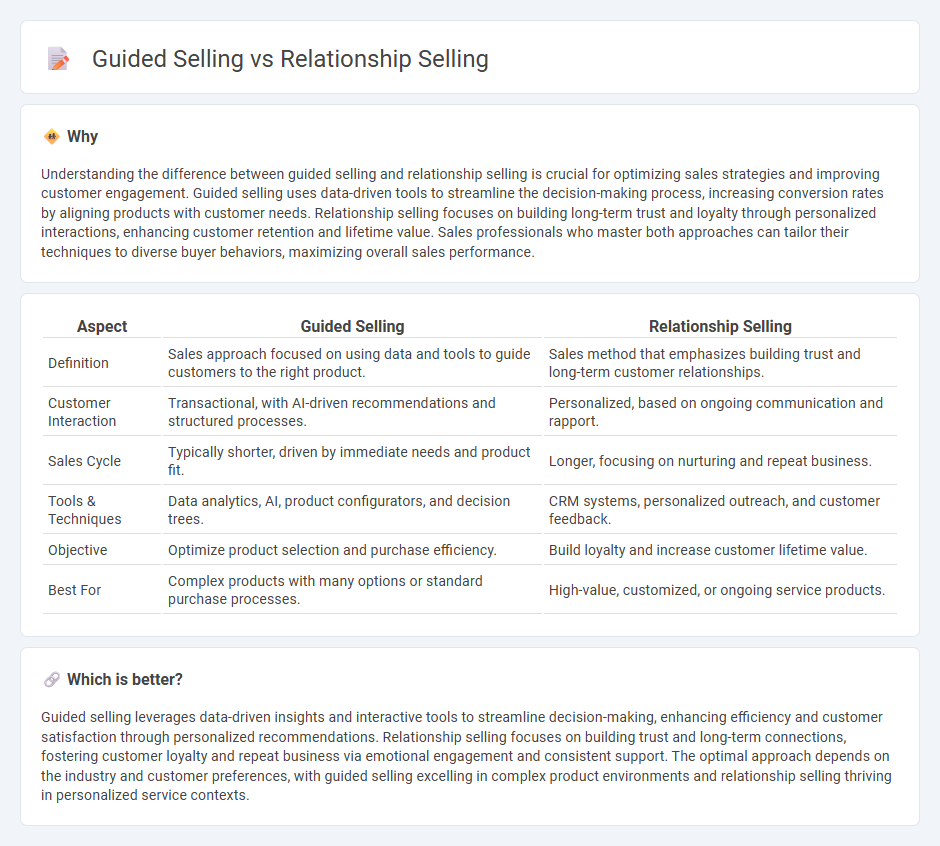
Guided selling leverages data-driven tools and AI to provide tailored product recommendations, enhancing customer decision-making and speeding up the sales process. Relationship selling focuses on building long-term trust and personalized interactions to foster customer loyalty and drive repeat business. Discover how integrating both strategies can maximize sales effectiveness and customer satisfaction.
Why it is important
Understanding the difference between guided selling and relationship selling is crucial for optimizing sales strategies and improving customer engagement. Guided selling uses data-driven tools to streamline the decision-making process, increasing conversion rates by aligning products with customer needs. Relationship selling focuses on building long-term trust and loyalty through personalized interactions, enhancing customer retention and lifetime value. Sales professionals who master both approaches can tailor their techniques to diverse buyer behaviors, maximizing overall sales performance.
Comparison Table
| Aspect | Guided Selling | Relationship Selling |
|---|---|---|
| Definition | Sales approach focused on using data and tools to guide customers to the right product. | Sales method that emphasizes building trust and long-term customer relationships. |
| Customer Interaction | Transactional, with AI-driven recommendations and structured processes. | Personalized, based on ongoing communication and rapport. |
| Sales Cycle | Typically shorter, driven by immediate needs and product fit. | Longer, focusing on nurturing and repeat business. |
| Tools & Techniques | Data analytics, AI, product configurators, and decision trees. | CRM systems, personalized outreach, and customer feedback. |
| Objective | Optimize product selection and purchase efficiency. | Build loyalty and increase customer lifetime value. |
| Best For | Complex products with many options or standard purchase processes. | High-value, customized, or ongoing service products. |
Which is better?
Guided selling leverages data-driven insights and interactive tools to streamline decision-making, enhancing efficiency and customer satisfaction through personalized recommendations. Relationship selling focuses on building trust and long-term connections, fostering customer loyalty and repeat business via emotional engagement and consistent support. The optimal approach depends on the industry and customer preferences, with guided selling excelling in complex product environments and relationship selling thriving in personalized service contexts.
Connection
Guided selling enhances relationship selling by providing personalized product recommendations based on customer data and preferences, fostering trust and long-term engagement. Both sales approaches prioritize understanding customer needs to deliver tailored solutions that build strong client relationships. Integrating guided selling tools within relationship selling strategies increases conversion rates and customer loyalty.
Key Terms
**Relationship selling:**
Relationship selling emphasizes building long-term trust and rapport with customers by understanding their needs, preferences, and pain points to deliver personalized solutions. This approach leverages ongoing communication and emotional connections to foster customer loyalty and encourage repeat business. Explore how relationship selling can transform your customer interactions and drive sustained growth.
Trust-building
Relationship selling emphasizes long-term trust-building through personalized interactions and emotional connections, fostering customer loyalty and repeat business. Guided selling leverages data-driven insights and intelligent recommendations to streamline decision-making, building trust by ensuring relevant product matches. Explore how integrating these strategies can enhance your sales process and deepen customer trust.
Long-term engagement
Relationship selling emphasizes building deep, trust-based connections over time, fostering customer loyalty through personalized interactions and continuous support. Guided selling leverages data-driven insights and technology to steer customers toward optimal choices quickly, enhancing the buying experience while also supporting long-term engagement. Explore how combining these strategies can maximize sustained customer relationships and drive business growth.
Source and External Links
Relationship Selling: 13 Tips to Sell Better and Close More - Relationship selling is a technique where the sales rep prioritizes building a strong connection and understanding of the customer's needs and challenges, providing ongoing value and personalized advice throughout and even after the sale.
Relationship Selling: Definition, Techniques and Examples - It is a sales approach centered on developing personal relationships with customers to build trust and loyalty, especially effective when selling high-commitment or high-cost items.
Relationship selling: Why it pays off to be human in sales - Relationship selling contrasts with transactional selling by focusing on consultative, customer-centric interactions that build long-term partnerships rather than quick, product-focused transactions.
 dowidth.com
dowidth.com